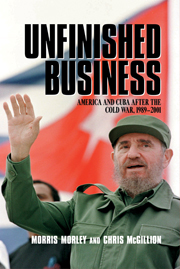Book contents
- Frontmatter
- Contents
- Acknowledgments
- Introduction
- 1 The Bush Administration and Cuba: From Cold War to Deep Freeze
- 2 Clinton and Cuba, January 1993 to February 1996: Closing the Options
- 3 Helms–Burton and the Triumph of Politics over Policy
- 4 Stirring the Waters: Clinton's Missed Opportunities
- Conclusion
- Postscript: Washington's Last Cold War
- Notes
- Index
1 - The Bush Administration and Cuba: From Cold War to Deep Freeze
Published online by Cambridge University Press: 28 July 2009
- Frontmatter
- Contents
- Acknowledgments
- Introduction
- 1 The Bush Administration and Cuba: From Cold War to Deep Freeze
- 2 Clinton and Cuba, January 1993 to February 1996: Closing the Options
- 3 Helms–Burton and the Triumph of Politics over Policy
- 4 Stirring the Waters: Clinton's Missed Opportunities
- Conclusion
- Postscript: Washington's Last Cold War
- Notes
- Index
Summary
I'm looking forward to being the first president of the United States to set foot on the free soil of post-Castro Cub.
George BushUNITED STATES policymakers' perceptions of the Cuban threat had diminished markedly as the 1980s drew to a close. The collapse of the Soviet Union and the ensuing crisis in the Cuban economy had forced the Castro government to take a number of foreign policy decisions that effectively marked its retreat – materially (with some exceptions) if not rhetorically – from the world revolutionary stage. The termination of Cuban military activities on the African continent – the withdrawal of troops from Ethiopia beginning in 1984–5 and Angola following Castro's decision to support a negotiated political settlement in December 1988 – signaled a fundamental shift in the broad thrust of Havana's international relations, from a foreign policy based on revolutionary politics to one increasingly determined by market possibilities and thus government-to-government relations. At the same time, Cuba's ability to challenge U.S. regional interests had waned considerably. Latin America had managed temporarily to ride out the debt crisis of the early 1980s without a political explosion and to contain the social costs of austerity measures and economic restructuring demanded by the United States, the International Monetary Fund (IMF), and other external creditors in return for new aid packages and lines of credit.
- Type
- Chapter
- Information
- Unfinished BusinessAmerica and Cuba after the Cold War, 1989–2001, pp. 10 - 51Publisher: Cambridge University PressPrint publication year: 2002

